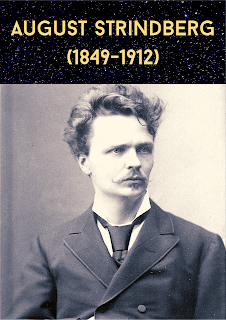Skip to main content
August Strindberg (1849-1912)
%20(1).png)
August Strindberg was a
Swedish dramatist who wrote some 70 dramatic pieces. He is best known outside
his native Sweden for a small number of plays that represent the range of his
achievement. The Father, Miss Julie, A Dream Play, and The Ghost Sonata have
earned him stature alongside Ibsen, Anton Chekhov, and George Bernard Shaw as seminal figures in the early years of modern drama.
August Strindberg’s drama
falls into two distinct periods, separated by the years of his personal
Inferno. The pre-Inferno plays are naturalistic in form and concerned with
sexual and class struggles. His late, expressionistic plays, written after a
period of intense despair and nonproductivity, reflect the emphasis on the atonement that characterizes later writing. These plays are important, especially for the ways in which they extend the boundaries of dramatic form.
Strindberg’s early plays
reflect the literary preoccupation of the time with the philosophy of
naturalism. The Father, produced and published in 1887, is considered the first
of his great naturalistic plays. His personal conflicts were to expand during
the Inferno Period, reflected in religious and historical plays produced
between 1897 and 1901. In those years, he turned to mysticism and allegory, as
in the Damascus trilogy.
Strindberg’s most
successful plays are “A Dream Play” and “The Ghost Sonata”, his two most
successful efforts. In the earlier play, the recurrent lament of the daughter
of Indra is, “Humankind is to be pitied”, reflecting the deep sadness of the
playwright. Like the Captain in the father. Strindberg was haunted by the
knowledge that a man can never know with
The certainty that he is his
child’s father. Laura’s manipulations are not less effective than those of Iago, and she emerges as the uncontested champion in this domestic duel of wills.
In the final tableau, the straitjacketed Captain lies helpless at the nurse’s
breast, repudiating his child, then falls in a fatal stroke; his wife,
embracing Bertha, cries, “My Child!”.
The Ghost Sonata (1908)
The Ghost Sonata is one of Strindberg’s
chamber plays, so named for their intimacy and lyricism. The dominant
consciousness in the play is a student named Arkenholz, who progresses through
the symbolic episodes of the dream. In the deepest room of the house is the
Hyacinth Girl, the vision of beauty and love that the student cannot resist.
A German student seeks to
enter the world of Hans Arkenholz, an old man in a wheelchair who tells him how
to get into the Wagnerian manor house where he first encounters Hummel. The
student observes Hummel’s inhumane treatment of the colonel’s wife and hears of
a network of sexual relationships as the residents of the house gather for
their ritual supper. In the Hyacinth Room, the clock that stood prominently on
the mantle in the Round Room has been replaced by a statue of the Buddha.
Strindberg’s The Ghost
Sonata is a richly evocative vision of guilt and expiation, of innocence and
evil, that extends to all humankind. As a student begins to awaken from his
dream, he speaks of what he has learned, reconciling the woe that he has
discovered and the innocence in which he had believed. Strindberg claimed that
writing the play was a painful experience, that he hardly knew himself what he
has written, but that he felt in it the sublime.
Comments
Post a Comment